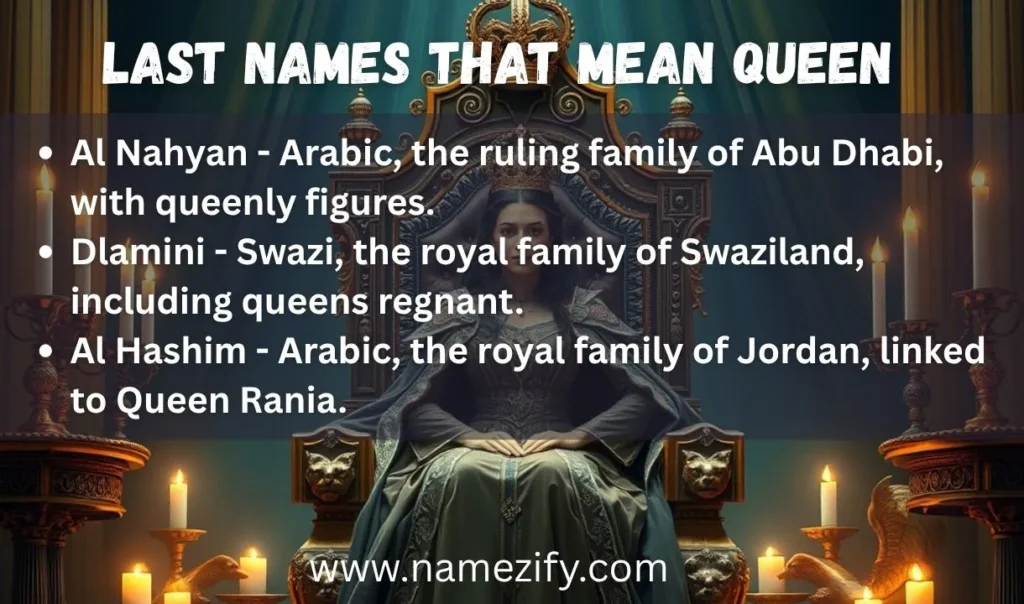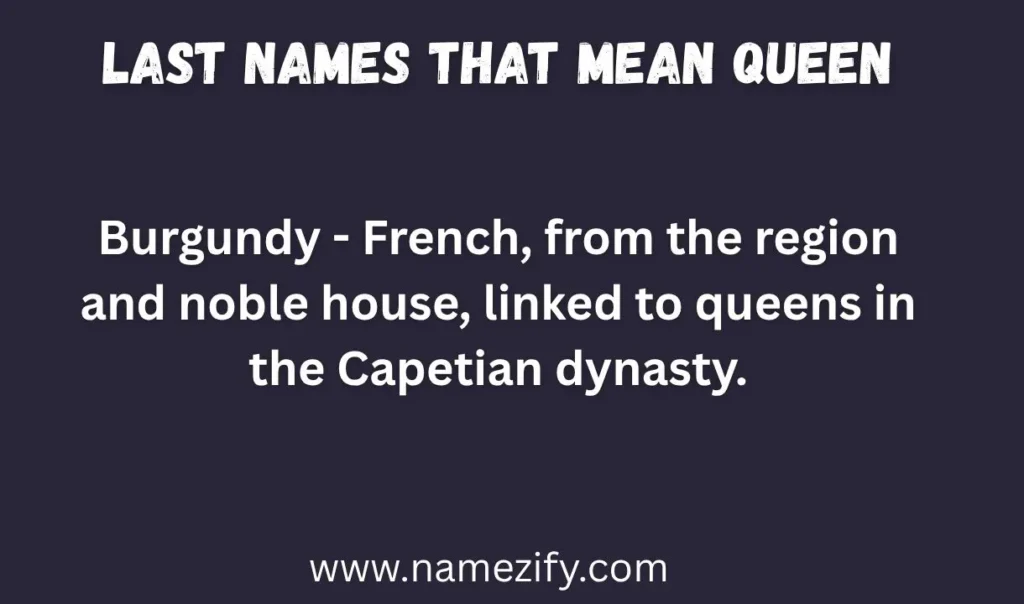Last names that mean queen carry a sense of regality and power, connecting individuals to a heritage of leadership and nobility. These surnames, derived from various languages and cultures, often reflect the status or role of queens in history. Understanding last names that mean queen can provide insight into one’s ancestry and the historical significance of these titles. Whether you’re researching your family tree or simply interested in the etymology of names, exploring last names that mean queen offers a fascinating glimpse into the past.

This article delves into the origins and meanings of such surnames, highlighting their importance in different cultures and their evolution over time. Furthermore, last names that mean queen can sometimes be linked to specific royal families or historical figures, adding layers of meaning to one’s identity.
90 Last Names That Mean Queen
- Queen – English/Scottish, from Middle English “Quene,” meaning “queen” or a pet form of names like Cwēnhild (queen + battle). Also a shortened form of McQueen.
- McQueen – Scottish, from Gaelic “Mac Shuibhne,” meaning “son of the pleasant one,” but often shortened to Queen, implying a regal connotation.
- Raines – English/Jewish (Ashkenazic), from Yiddish “Rayne,” cognate with Hebrew “Malka” (queen), used as a metronymic surname.
- Malka – Hebrew, directly meaning “queen,” used as a surname in Jewish communities.
- Reina – Spanish, meaning “queen,” derived from Latin “regina.”
- Regina – Latin/Italian, meaning “queen,” used as a surname in various European cultures.
- Rana – Indian/Nepali, from Rajput origins meaning “king,” but used in contexts implying royal authority, including queens.
- Windsor – English, from Old English “windy bank,” the surname of the British royal family, associated with Queen Elizabeth II.
- Mountbatten-Windsor – British royal surname, combining Windsor with Mountbatten, used by descendants of Queen Elizabeth II.
- Stuart – Scottish, meaning “guardian” or “warden,” linked to the House of Stuart, including Queen Anne.
- Tudor – English, from the Welsh “Tewdwr,” associated with the English royal dynasty, including Queen Elizabeth I.
- Bourbon – French, the royal house of France, linked to queens like Marie Antoinette.
- Valois – French, a royal house with queens like Catherine de’ Medici.
- Habsburg – German/Austrian, a prominent royal dynasty with influential queens like Maria Theresa.
- Nefertiti – Egyptian, from Queen Nefertiti of the 18th Dynasty, used as a surname in historical contexts.
- Philopator – Greek/Egyptian, surname of Cleopatra, meaning “father-loving,” tied to her queenship.
- Artois – French, from the noble family descended from Louis VIII, associated with French queens.
- Capet – French, from the House of Capet, rulers of France with notable queens.
- Arlay – French, part of the House of Ivrea, associated with nobility and queens.
- Angelos – Byzantine, a noble family name tied to the Byzantine Kingdom, with empresses.
- Alpin – Scottish, from the Alpin dynasty, rulers including queens in early medieval Scotland.
- Wessex – Anglo-Saxon, from the kingdom of Wessex, associated with early English queens.
- Hanover – German/British, the royal house of Queen Victoria, meaning “high bank.”
- Saxe-Coburg-Gotha – German/British, the royal house before Windsor, linked to Queen Victoria.
- Cromwell – English, from Oliver Cromwell, but also tied to noble governance, implying authority.
- Mattei – Italian, from “Matteo” (gift of God), linked to papal nobility and queens in the 1500s.
- Macedonian – Greek, from the dynasty of Alexander the Great, including queens like Olympias.
- Munsö – Swedish, from the House of Björn Ironside, Viking rulers with queenly figures.
- Utheemu – Maldivian, from the royal dynasty of the northern Maldives island.
- Wilhelminer – German, from the noble family ruling Bavaria, linked to queens in the 9th century.
- Schmitt – German, meaning “blacksmith,” but tied to noble Bavarian families with queenly roles.
- Eleanor – Greek/French, meaning “bright, shining one,” linked to Eleanor of Aquitaine.
- Ferdinand – German, meaning “brave,” associated with Austrian queens like Maria Anna.
- Fenrich – German, from “fahne” (flag), tied to Austrian nobility with queenly connections.
- Arco – Italian, from Latin “arcus” (bow), a noble family with ties to queens.
- Stanley – English, meaning “stone clearing,” tied to the Stanley-Audley noble family.
- Campbell – Scottish, meaning “crooked mouth,” a dominant clan with queenly figures.
- Iturbide – Mexican, from the 19th-century Mexican Empire, linked to Empress Ana María.
- Kamehameha – Hawaiian, from the royal family, including Queen Liliuokalani.
- Orléans-Braganza – Brazilian, from the ruling house of the Brazilian Empire.
- Maxwell – English, from Baron Peter Trevor Maxwell, implying noble authority.
- Sowden – Old French, from “Soudan” (sultan), implying regal power.
- Ernušt – Hungarian/Jewish, from Hungarian nobility with queenly associations.
- Valentine – Latin, meaning “strong, healthy,” tied to noble figures.
- Abdulaziz – Arabic, from the Saudi royal family, linked to queens and princesses.
- Alawo – Yoruba, meaning “born into royalty,” associated with African queens.
- Al Maktoum – Arabic, the royal family of Dubai, with influential female royals.
- Mwene – Luba (Congo), meaning “lord” or “chief,” used for rulers including queens.
- Bergoglio – Italian, Pope Francis’s surname, tied to spiritual leadership akin to queenship.
- Lamberg – German, from 16th-century barons, implying noble governance.
- Aethelwulf – Anglo-Saxon, meaning “noble wolf,” tied to Wessex kings and queens.
- Gaynor – Irish/Welsh, from “Gwenhwyfar” (Guinevere), meaning “fair, smooth,” linked to King Arthur’s queen.
- Bogue – Irish/Scottish, from Gaelic “Buadhach” (victorious), cognate with Boudicca, the Iceni queen.
- Hercules – Latin/Greek, meaning “glory of Hera” (queen of the gods), used in Hispanic contexts.
- Mordecai – Jewish/Welsh, linked to Esther, the biblical queen who saved the Jews.
- Ríoghnach – Irish, from “rígain” (queen), a mythological name used as a surname.
- Teuta – Albanian, from an Illyrian title meaning “queen, lady of the people.”
- Taguhi – Armenian, meaning “queen,” used as a surname in Armenian communities.
- Rhiannon – Welsh, from Celtic “Rīgantonā” (great queen), a mythological surname.
- Malika – Arabic, meaning “queen,” the feminine form of Malik, used as a surname.
- Candace – Biblical/Ethiopian, from Cushitic “kdke” (queen mother), used as a surname.
- Ece – Turkish, meaning “queen” or “beautiful woman,” used as a surname.
- Juno – Roman, from the goddess Juno, queen of the heavens, used as a surname.
- Isolde – Celtic, meaning “ice ruler,” linked to the Arthurian queen.
- Antinea – French/Greek, from the mythical Queen of Atlantis.
- Berenice – Greek, meaning “bringer of victory,” wife of King Ptolemy I, used as a surname.
- Dione – Greek, meaning “divine queen,” mother of Aphrodite in mythology.
- Erica – Norse/German, meaning “regal majesty” or “complete ruler.”
- Fritzi – Germanic, feminine of Fritz, meaning “protection” or implying queenly nature.
- Geraldine – Germanic, from a poet inspired by Fitzgerald, implying noble rule.
- Harriet – Germanic, from “Henri” (estate ruler), linked to Harriet Tubman.
- Alexandra – Greek, feminine of Alexander, an alias for Hera, queen of Olympus.
- Amirah – Arabic, feminine of Amir, meaning “princess” or “queen.”
- Agrata – Hindu, meaning “one who goes before,” implying queenly leadership.
- Victoria – Latin, meaning “victory,” linked to Queen Victoria.
- Helena – Greek, meaning “bright, shining light,” tied to queens like Helena of Troy.
- Elizabeth – Hebrew, meaning “God is my oath,” used by Queen Elizabeth II.
- Diana – Latin, meaning “divine,” linked to Princess Diana, a modern “queen.”
- Lilibet – English, a nickname for Elizabeth, used as a surname for Mountbatten-Windsor.
- Gwenllian – Welsh, from “gwen” (white, blessed), used by medieval Welsh royalty.
- Hammoleketh – Hebrew, meaning “the reigning one, queen,” from the Old Testament.
- Ereshkigal – Sumerian, meaning “lady of the great earth,” a goddess-queen surname.
- Morrígan – Irish, meaning “demon queen” or “great queen,” from mythology.
- Milcah – Hebrew, from “malka” (queen), a biblical surname.
- Sarai – Hebrew, meaning “princess,” original name of Sarah, wife of Abraham.
- Sadie – English, a nickname for Sarah, meaning “princess” or implying queen.
- Mira – Sanskrit/Latin, meaning “admirable,” linked to royal names like Mirra.
- Zara – Arabic/Hebrew, meaning “princess” or “radiance,” tied to royalty.
- Eulalia – Greek, meaning “sweetly speaking,” a royal name with queenly connotations.
- Orla – Irish, meaning “golden princess,” implying queenly status.
- Aubrey – Germanic, meaning “elf ruler,” used for noble women.
- Etta – English, short form of names like Henrietta, meaning “estate ruler.”
- Katherine – Greek, meaning “pure,” linked to queens like Katherine Parr.
- Isabella – Hebrew/Latin, meaning “pledged to God,” tied to Isabella of France.
- Wu – Chinese, from Empress Wu Zetian, the only female ruler of China.
- Parr – English, linked to Katherine Parr, meaning noble governance.

Conclusion
In conclusion, last names that mean queen are a testament to the enduring legacy of royalty and leadership across different cultures. These surnames, whether derived from English, Sanskrit, Arabic, or other languages, carry with them a sense of history and prestige. Understanding the meaning behind last names that mean queen can enrich one’s appreciation of their family heritage and the broader tapestry of human history.
As we continue to explore and celebrate our diverse backgrounds, these royal surnames serve as a reminder of the queens who have shaped our world. Moreover, last names that mean queen often reflect the societal structures and values of the times in which they were formed, highlighting the importance placed on monarchy and the roles of queens in governance, culture, and society.
FAQs
- What are some common last names that mean queen?
- This question encourages readers to explore the list of surnames, such as Queen and McQueen, that directly or indirectly mean “queen.
- How did last names like Queen and McQueen originate?
- This question delves into the historical and linguistic roots of these surnames, highlighting their English and Scottish origins.
- Are there last names that mean queen in languages other than English?
- This question emphasizes the multicultural aspect, covering names like Rani, Malika, and Reina from Sanskrit, Arabic, and Spanish.
- Can last names that mean queen be found in different cultures?
- This question broadens the scope, showing how these surnames appear in diverse regions like India, the Middle East, and Spanish-speaking countries.
- What is the significance of having a last name that means queen?
- This question connects the topic to personal identity, exploring the pride and historical significance of bearing a regal surname.
